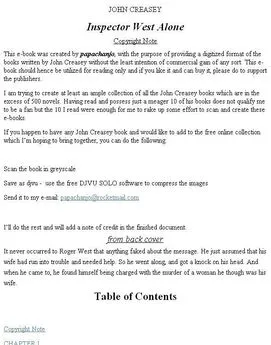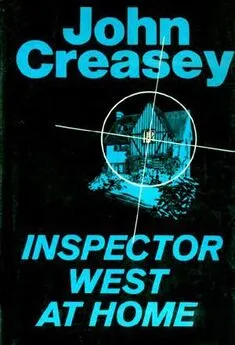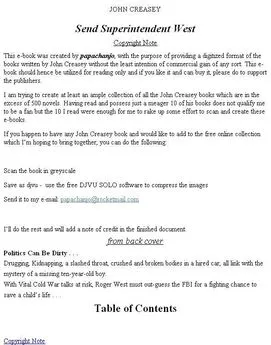John Creasey - Inspector West Alone
- Название:Inspector West Alone
- Автор:
- Жанр:
- Издательство:неизвестно
- Год:неизвестен
- ISBN:нет данных
- Рейтинг:
- Избранное:Добавить в избранное
-
Отзывы:
-
Ваша оценка:
John Creasey - Inspector West Alone краткое содержание
Inspector West Alone - читать онлайн бесплатно полную версию (весь текст целиком)
Интервал:
Закладка:
Marion held tightly on to his arm.
No one appeared to follow them, but he was sure that they were being watched wherever they went; that sixth sense which came from years of experience hadn’t died. They came upon a large hotel, where a sign outside read : Tea Dance, Daily, 3s. 6d.
“Where are we?” Roger asked.
“Worcester.”
He recalled it, now. The old town cheek by jowl with the new. They went in. The atmosphere was friendly, a good band was playing, but only three couples were dancing, half a dozen others sitting round a large room. The waiter came up promptly.
They danced; Marion was as light as a feather.
“If we could go on like this,” she said.
He nodded, but made no comment. Her presence hurt because she reminded him of Janet in her complete contentment at being with him. He danced mechanically a quick-step with a gay lilt and quickening rhythm.
Then he saw a couple enter; and he froze.
Marion said: “Don’t look like that!” He turned away, but looked at the new-comers out of the corner of his eye. It wasn’t fancy. His blood ran hot, he missed a step again. Marion asked urgently:
“What is it?”
He didn’t answer, but led her towards their table, feeling physically sick and racked with pain. The new-comers looked around—man and woman.
Man—and JANET.
* * * *
The man was Mark Lessing, Roger’s one close friend.
* * * *
“What is it?” demanded Marion. “Please tell me.”
“Never mind.”
“Have you seen someone you know?”
“Yes. Please don’t talk.”
She fell into a reluctant silence. Janet took off her coat, the now shabby black sealskin which he had bought her years ago. Mark put it over the back of her chair, Janet was sideways towards Roger, not five yards away. She began to look round her, and he hated what he saw in her grey-green eyes. She was older—careworn and tense. Her hands were clenched in her lap. Her eyes sought out every man here, and Roger knew she was looking for him. She’d come here, hoping to see him, but the hope was already dying. She looked at him, but her gaze didn’t linger for a moment; she showed no interest in Marion.
Her eyes were so tired, her hair, dark yet usually so full of light, had lost its lustre. Mark Lessing gave her a cigarette, and she began to smoke nervously, agitatedly.
Mark sat back, looking about him with less obvious tension than Janet, but eagerly, searchingly. He was good-looking—in his way, handsome. His expression was austere, and those who did not know him well took him for a snob. His skin was rather sallow, his dark hair was wavy, and worn too long; it looked affected.
No two people knew Roger so well.
“Please tell me,” Marion whispered.
“A friend—of mine.”
“Oh. Kennedy——”
“Sent us here. This is a test of my nerves and goodwill. I’d rather not talk.”
“It’s your wife isn’t it?” Marion said in a flat voice.
Roger nodded.
“She’s——”
“Don’t.”
“She’s very sweet.”
“Let’s get out of here!”
“No! Kennedy’s watching.” Marion feared Kennedy so much.
Kennedy was grinning, as if to himself.
“Come on,” said Roger.
He led the way, and Kennedy still grinned. Mark glanced at him; was there a puzzled gleam in his eyes? Roger paid at the cash desk, and when he looked round, neither of the others was looking at him. He was sticky hot. He went into the lobby and saw a man sitting in an easy-chair, from which he could see into the ballroom. It was all Roger could do to look away from the watcher who was Detective Inspector Sloan of New Scotland Yard —and no man at the Yard knew Roger more intimately.
Sloan stared at him blankly.
* * * *
The film didn’t matter; all he saw was Janet. It was dark when they left. The male nurse was outside with the car. The journey to the nursing-home took an hour. He wanted to get to his room and be on his own, but Kennedy called him into the lounge. Marion made to follow.
“Not you,” Kennedy said. “Close the door and leave us alone.”
Marion obeyed.
Kennedy grinned. “Good, isn’t it, West?”
“Is it?”
“I’d call it good. In future, you’re to be known as Rayner—Charles Rayner. I’ve a passport, registration card, business, home, past history, and everything else you might need. Don’t forget, Mr. Rayner.”
“You forget my bad memory.”
“Your memory is all right, so far, but it won’t hurt for long. Marion’s a nice girl, and she’s yours for the asking. Oh— Rayner . ”
“Well?”
“You might have the bright notion of sending word to your wife. Don’t. I sent her a message, saying she might see you in Worcester to-day. So she hasn’t given up hope. I knew she was on the way, when you left. Know how I knew?”
Roger didn’t answer.
Kennedy laughed.
“Your wife has a new maid. She’s spent so much time away on wild-goose chases after you that she had to have a reliable nurse for the boys. She’s got one. That nurse will be loyal to her for exactly as long as you’re loyal to me. Not a day longer. You’re no fool, West. If your wife got a message which convinced her you’re alive, she’d tell the nurse—or at least, give it away. Remember all this. The nurse is a nice girl, and fond of children. But she’ll do what I tell her. I don’t want to have to hurt the kids.”
* * * *
Roger left the house again a week after he had seen Janet.
London!
Fresh under an April sun, but with her great buildings dark with smoke and grime. London, a seething, toiling mass of people, crowded streets, giant red buses, box-like taxis, shops, shops, shops—and factories, docks, the broad, smooth Thames. The London he knew and loved, revealed to him again as he was driven along the straight, wide tawdriness of Oxford Street, into Regent Street with its curving stateliness. Piccadilly bustle, Leicester Square a quiet, friendly grass patch with gargantuan cinemas around it, Trafalgar Square, Whitehall, massive Government buildings and—Scotland Yard. The driver turned towards Scotland Yard, but didn’t go past the gates. He stopped the car so that Roger could see the reddish brick of the old building, housing the civil police. Constables on duty looked at them disinterestedly, as at all sightseers. They drove past Cannon Row Police Station, dark, low-roofed, and dingy, with its barred windows. He knew every inch of it—and of the Yard. It had been his life.
The Embankment; the white new building, housing the C.I.D. Then they drove off the cluttered road near the pale-grey austerity of the new Waterloo Bridge, and into the Strand.
Roger, by the driver’s side, hadn’t said a word since they had reached London. Now :
“Where are we going?”
“You’ll see.”
They turned out of the Strand, near Covent Garden, empty and desolate and waiting for the next day’s business. They stopped in a narrow street. Here the buildings were old—a mixture of flats and offices.
“This is you,” said the driver. “Number 15.”
Roger got out. Number 15 was opposite—with an open door, a dark hallway, and narrow stairs. He went in, completely mystified. The driver sat in the car and grinned at his back. He glanced at the notice-board: there were six names, and one newly painted sign read:
Charles Rayner.
Commission Agent.
Wholesale—Retail.
4th Floor.
There was no lift. He walked upstairs slowly. He was Charles Rayner, and this was where he would work, do what “business” he would. It was dark on each landing; darkest on the fourth where a broken window was boarded up. He stood undecidedly outside a door marked with his new name; took the plunge and opened it.
A man leapt at him from the corner behind the door.
CHAPTER XI
GINGER
WILD eyes burned in a pale face. An iron rod clenched in a claw-like hand brushed Roger’s shoulders as he swung to one side. The rod hit the door with a metallic clang, and clattered on the floor. Roger ducked and dodged, then went into the attack, striking out savagely.
Right to the stomach; left to the chin. The first blow brought forth a soughing groan, the second, a screech. The man backed away helplessly, banged against a chair and sprawled into it.
Roger closed the door, and listened intently. He could hear a typewriter, going at speed; that was distant, the only audible sound. The man in the chair sat up, licked his lips and put out a hand as if afraid of further violence.
“Can you give me one reason why I shouldn’t break your neck?” Roger growled. His voice was hard and grating, the voice he’d trained himself to acquire.
The man cowered back; hardly a hero. He wasn’t difficult to read. He had screwed himself up to make that assault, and when it had failed, courage went out of him like air from a punctured balloon.
He was thin, his pallor sickly. He needed a shave, and his gingery hair wanted cutting. His clothes were poor; navy-blue suit frayed at the cuffs, and a choker-scarf, not a collar and tie.
This was a waiting-room; the high, cream-washed walls were bare, and there were two leather arm-chairs and four good uprights, reproduction Hepplewhite. On a plain walnut table, a dozen new magazines were neatly placed; alongside it was a similar arrangement of trade periodicals. There was a faint smell, dry and not unpleasant, of distemper. Two doors led from here. One was marked: Inquiries: Please Ring, with a sign beneath a bell-push; the other, Charles Rayner , Private. There were frosted-glass panels in each.
“Why did you attack me?” Roger demanded, roughly.
“I—thought——” The man hesitated, thrusting out his hands appealingly. “You’re not the man I expected.”
“It would still have been murder.”
“I came to kill him.”
You couldn’t mistake the touch of dignity which came unexpectedly with the words; the man was proud of what he had come to do.
Roger said: “Stay there.” He turned, pushed open the inquiries door and saw a large office, with six or seven desks, three typewriters, several telephones, cabinets—a well-equipped place, where everything was new. There was a large cupboard, with hooks for hats and coats. He went back, gripped the ginger-haired man and took him into the room and locked him in the cupboard.
Another door led from this room—to the “Private” one. Roger opened it; the office beyond was sumptuous; more study than office, with a thick carpet, panelled walls, a library of books, and several easy-chairs. No one was here. He studied the ceiling and the panelled walls; a policeman again, knowing exactly what he wanted and knowing pretty well where to find it. He saw a small panel, one of several in the wall behind the desk, and prised it open with his fingers.
He grinned broadly; that was his first natural smile since he had left Scotland Yard.
Inside a foot-deep cavity was a tiny dictaphone recording outfit. He switched it off, using a pencil, and closed the panel. Then he scanned the ceiling and panelling again until he was sure there was no peephole through which he could be watched or heard. He went to the outer room. The ginger-haired man stepped meekly out of the cupboard.
“In here,” Roger said.
He locked the outer door with the key on the inside; there was no way of getting in except by the windows. These overlooked a blank wall, and the drop to the area below was sheer. He stood first at one side, then the other, to make sure that the office could not be overlooked. Finally, with the ginger-haired man gaping and nervous, he stood on a corner of the desk and examined the ceiling; no, there was no break to mar the white paper; no peephole through which he could be watched.
Читать дальшеИнтервал:
Закладка:










